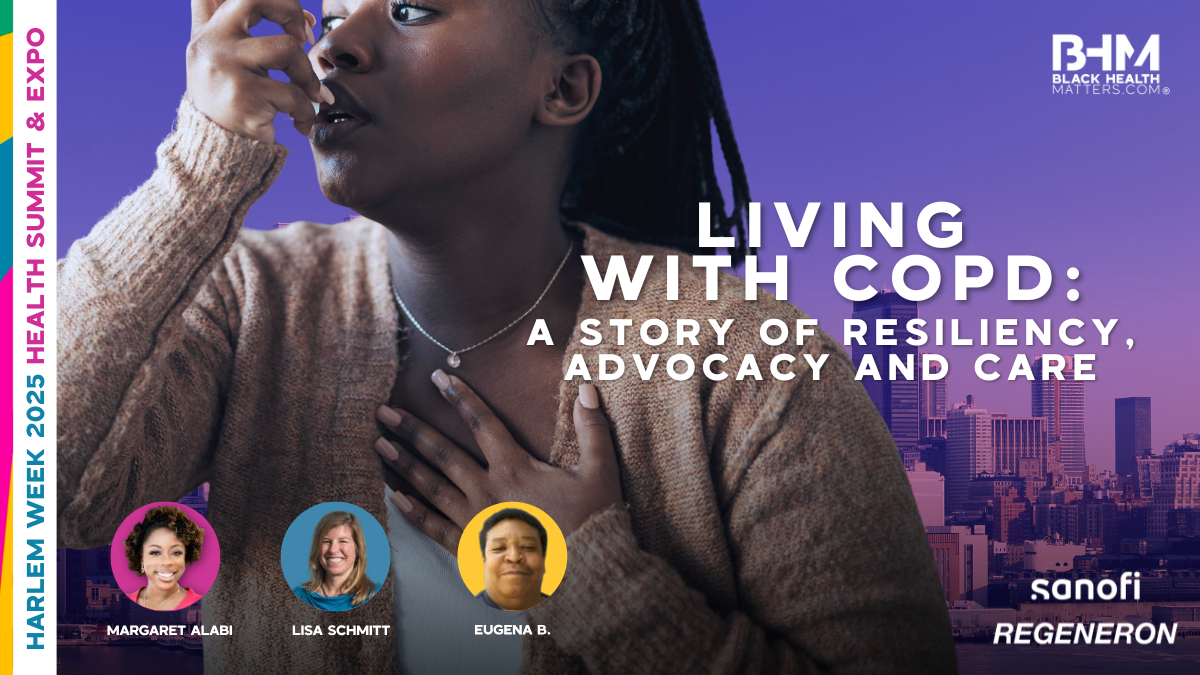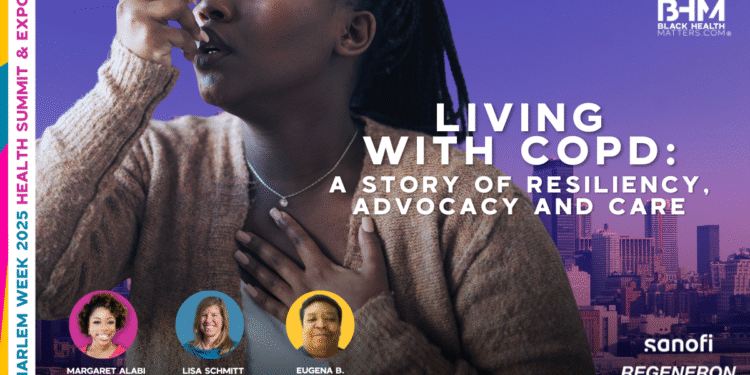
Chronic obstructive pulmonary disease (COPD) is the third leading cause of death in the United States, but it can be totally invisible at times. It can totally change your life without anyone around understanding why you need to gasp for breath in the grocery store or struggle to take your dog to the curb. The result of that can cause mental anguish and require intense support. At this year’s Black Health Matters Harlem Week Health Summit, attendees learned about COPD from someone facing its realities.
“This is a disease that worsens over time. It is known to cause permanent lung damage, and COPD is also a debilitating condition that impacts people both physically and mentally,” said Margaret Alabi, Director, Patient Advocacy, US & Global Dermatology Regeneron.
Table of Contents
She described the various ways it can impact patients as it progresses through their bodies.
“Symptoms of COPD. They include breathlessness, excessive mucus production, cough, and chest tightening. This is caused by a decrease in the lungs’ ability to function. This also causes exhaustion and fatigue,” said Alabi.
“Over time, people that are living with COPD often feel embarrassed from these symptoms, because when they’re out in public, their movement is limited, and it’s very challenging for folks to understand what’s wrong with them,” Alabi continued. “It impacts the everyday activities, like walking. Walking to the mailbox can be a major task, standing up to cook your favorite meal, or even getting dressed up for the day can be a major task.”
“1 in 5 people with chronic obstructive pulmonary disease (COPD) experience social isolation,” according to the Journal of the American Medical Association. Alabi described the way that isolation can affect COPD patients and their loved ones.
“That then begins to impact a person’s mental health, so people living with and or suffering from COPD are not the only people that have to be considered, but also their family, friends, and caretakers that are impacted by this condition,” she continued.
Eugena revealed that she was heavily restricted in her day-to-day activities following her diagnosis. It threw her that it was chronic. She joked that she had refused to go into nursing after her mother chose the profession, yet she ended up spending all her time dealing with doctors. She worked to get answers about her severe symptoms.
“Black individuals in the United States may be preferentially affected by COPD, with their prevalence and morbidity varying widely among subgroups because of biological, socioeconomic, and cultural factors,” according to the American Journal of Respiratory and Critical Care Medicine. That is not always reflected in the way that they are treated, as Schmitt pointed out in the conversation. “You think of COPD. You don’t think of women right away. You don’t think a Black woman right away,” she said.
Eugena revealed what it was like navigating through the healthcare system with COPD. “They gave me headaches between the co-pays and what they don’t cover,” she said. “It got no better when I became disabled and then had to switch to government insurance, okay? Better known as Medicaid and Medicare, again, here we go, even more headaches, even more restrictions, even more lack of cooperation.”
She refused to try to improve her situation. She followed up, asked questions, and persisted with treatments.
She advised those managing COPD to listen to their bodies to prevent bouts. “Look at the process of what’s happening with you and learn to recognize the signs of it beginning,” said Eugena. That can help you communicate with your healthcare providers and potentially live beyond blanket restrictions. Each day for Eugena is different, but some feel like wins.
Eugena advised those managing COPD to take an organized approach to seeking help, to maintain their ability to engage in some of the activities they enjoy.
“Once you get your wits about you. You’ve got to come up with a game plan for advocating for yourself. Write down what you don’t understand, what you don’t know, what you need to find out. Talk to your physician. Work with them if you’re not comfortable with that person. Go get another one,” she said. “Study your condition. Study how it functions with you. Learn The Telltale signs because all of these things are your tools to help you maintain and improve your situation, and you can do so.”
Eugena illustrated her progress by reminding the room that there was a time she wouldn’t have been able to attend the packed event.
“I could not leave my apartment. I could barely move in my apartment,” she said, turning to the audience.
“I ran up those stairs this morning.”
Resources:
























